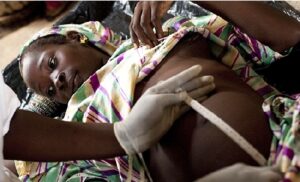FG to Launch Emergency Care Program for 1.7 Million Pregnant Women in Rural Areas
FG to Launch Emergency Care Program for 1.7 Million Pregnant Women in Rural Areas

The Federal Government has announced plans to introduce the Rural Emergency Service and Maternal Transportation (RESMAT) initiative, aimed at saving the lives of 1.7 million pregnant women in rural Nigeria and reducing maternal mortality rates.
Adejoke Dada, representing the National Emergency Medical Service and Ambulance System (NEMSAS), revealed that the initiative, in partnership with the World Bank, is designed to address gaps in timely, affordable, and appropriate healthcare for pregnant women in remote areas. The program is set to begin in January 2025 and will initially roll out in 15 states, including Ekiti.
Speaking at a stakeholders’ meeting in Ado Ekiti, Dada explained that the primary goal of the program is to provide rural pregnant women with better access to emergency healthcare services, ultimately reducing maternal and infant mortality. “This initiative will help 1.7 million pregnant women in rural areas get the emergency care they need to ensure they don’t die during childbirth, and to prevent neonatal deaths caused by preventable diseases,” she stated.
The project is being spearheaded by Health Minister Prof. Ali Pate, who is focused on improving healthcare in regions with high maternal and infant mortality rates. Dada emphasized that the 15 selected states, with the highest mortality statistics, will benefit from this life-saving initiative.
Dr. Prosper Ahworegba, a resource person from NEMSAS, elaborated on the role of the World Bank in the program, highlighting their provision of ambulances to the 15 states. These ambulances will facilitate the transportation of pregnant women and children to primary healthcare centers or specialized obstetrics and neonatal facilities in emergencies.
Ahworegba stressed the urgent need for the program, noting that maternal and infant mortality rates in Nigeria remain shockingly high compared to global standards. “While countries like the UK report only seven maternal deaths per 100,000 live births, Nigeria has between 576 and 615 deaths per 100,000 live births—an unacceptable figure,” he said. “A major cause of these deaths is the lack of access to healthcare, especially in rural areas where transportation to health facilities is often unavailable.”
Under the RESMAT initiative, ambulances will be stationed in various wards, serving around 10,000 people each. Users will pay a nominal fee to help sustain the service. “The ambulances will be ready to transport sick children or pregnant women to the nearest emergency care facility. Our aim is to save the lives of 1.7 million rural women,” Ahworegba explained.
Dr. Ayodele Seluwa, Executive Secretary of the Ekiti State Primary Healthcare Development Agency, spoke about the positive impact of the program on healthcare access in the state. Representing the state’s Commissioner for Health, Dr. Oyebanji Filani, Seluwa noted that transportation barriers are a key contributor to high maternal and infant mortality rates in some rural communities. “This initiative will fill the critical gap in transportation and ensure that women in rural areas can reach the care they need,” he said.
Seluwa also emphasized the importance of community involvement to ensure the success of the program. He added, “With adequate information, people will know how to access the ambulance service, and the community will take ownership, ensuring that the system works effectively for everyone.”
The launch of the RESMAT initiative is expected to significantly improve maternal and child health outcomes in the selected states, contributing to the reduction of preventable deaths
in rural Nigeria.
TRENDING SONGS
 NPMA Appeals to Nigerian Government for Compensation After Lagos Market Fire
NPMA Appeals to Nigerian Government for Compensation After Lagos Market Fire
 Rest Every Four Hours, FRSC Issues Safety Guide for Fasting Motorists
Rest Every Four Hours, FRSC Issues Safety Guide for Fasting Motorists
 NNPC Boss Ojulari Bags UK Energy Institute Fellowship
NNPC Boss Ojulari Bags UK Energy Institute Fellowship
 Shock in Anambra: Bride Disappears Moments Before Wedding
Shock in Anambra: Bride Disappears Moments Before Wedding
 Nigerian Woman Returns ₦330 Million Accidentally Credited to Her Account
Nigerian Woman Returns ₦330 Million Accidentally Credited to Her Account
 APC Don Reach Morocco?’ VeryDarkMan Reacts to Seyi Tinubu Poster
APC Don Reach Morocco?’ VeryDarkMan Reacts to Seyi Tinubu Poster
 Bride Breaks Down in Tears as Wedding Meals Were Kept Secretly While Guests Go Home Hungry
Bride Breaks Down in Tears as Wedding Meals Were Kept Secretly While Guests Go Home Hungry
 Odogwu by Day, Robber by Night: How Marriage Joy Turned Into Tragedy
Odogwu by Day, Robber by Night: How Marriage Joy Turned Into Tragedy
 Nigerian Officials Allegedly Pocket N4–6B Weekly Through Smuggling Cartels at Seme–Badagry Border
Nigerian Officials Allegedly Pocket N4–6B Weekly Through Smuggling Cartels at Seme–Badagry Border
 Ahmad Yerima: Naval Officer to Face No Sanctions After Clash with Wike – Matawalle
Ahmad Yerima: Naval Officer to Face No Sanctions After Clash with Wike – Matawalle
Share this post with your friends on ![]()













